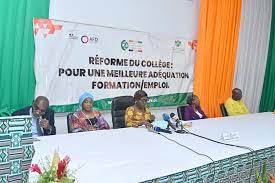Côte d’Ivoire is aiming to make its education system one of the best in the world by adapting its curricula to 21st century skills.
Côte d’Ivoire’s Minister of National Education and Literacy, Mariatou Kone launched the secondary school curriculum reform process in Abidjan on Tuesday 6 August 2024, in the presence of members of the education community.
“The learning crisis has not spared any education system in the world, and ours in particular, with its lacklustre results, especially at international level with the various assessments of learning achievements,” she said, insisting on the Education Systems Analysis Programme, PASEC).
“As soon as I took up my post at the head of this ministerial department, this justified the organisation of the National Education and Literacy Conference,” she added, pointing out that the conference identified 42 transformative levers for improving the performance of the Ivorian education system.
Following the adoption of the conclusions and recommendations of these inclusive and participatory meetings on the Ivorian education system, the Ministry of Education, with the support of technical and financial partners, is now moving ahead with their effective implementation, she pointed out.
The reform of the lower secondary school, which is part of this implementation, is part of a demographic context marked by a very sharp increase in the flow of pupils entering lower secondary school, with a rate of 58 percent of those going to public schools, Professor Mariatou Kone pointed out.
“We want reform, and we need to start,” she said, explaining that this reform of the secondary school curriculum was in line with the head of state’s vision that “schools should be characterised by excellence, equity and equal opportunities.”
According to the timetable for the secondary school curriculum reform process, officially launched on 6 August, on the eve of the country’s 64th birthday, workshops are planned between now and September 2024 to define the reform methodologies and the curriculum orientation framework.
From October 2024, workshops will begin to validate the common base, as well as workshops on the revision of educational programmes.
The revision of the curricula will continue between November and December 2024.
Printing of the revised curricula will begin in February 2025, followed by testing of the curricula from September 2025 to May 2026.
A workshop to review the testing of the educational programs will complete the process before implementation in 2027-2028.
AFD, C2D, the Agence universitaire de la Francophonie, through its Apprendre programme, and UNESCO will support the pilot phase of implementing the new curricula, Professor Mariatou Kone concluded.
AP/Sf/fss/as/APA


